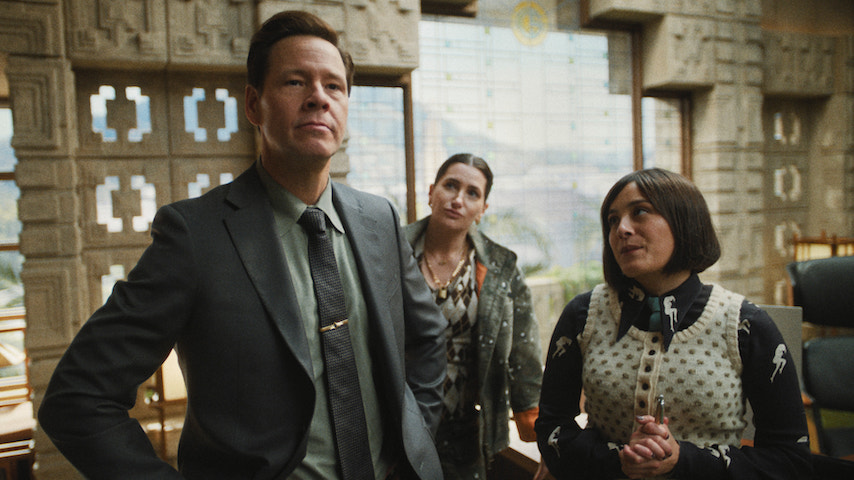Once again, “The War” exists mostly to give a platform to Wonders and Ike Barinholtz as they try to get very different versions of Wink into production. Barinholtz’s Sal has been meeting with Smile director Parker Finn for weeks and keeps trying to get Matt to sit down and close the deal. Who better to make the Smile rip-off than the guy who made Smile? Sal is a fascinating character because he’s undeniably over-aggressive—it’s hard to believe someone hasn’t called him toxic in the workplace—but he’s also often right. Hollywood works on formulas. And, as much as people bemoan them, they go see the things that make them comfortable, as evidenced by how familiar IPs dominated the box office last year. They’re more likely to see “Wink from the director of Smile” than “Wink from the director of Funny Pages,” and Sal has been in the game long enough to know that. There are hints in “The War” that a younger Sal may have once had the vision of Quinn about what could be done in the system and has now come to terms with what should be done to keep companies like Continental from going under.
Quinn is still young enough to dream even though just being on the Continental lot seems to make that difficult. As Netflix takes over the lot and parking spots to film their miniseries Waterloo, Quinn faces a string of indignities that are so distracting that she can’t even enjoy sex because she’s “tired of getting fucked.” Wonders is so great in this episode, conveying the increased fearlessness that often comes with frustration. She’s been trying to get Owen Kline a project at Continental for a while now, and she’s forced to adapt when Matt shoves that project together with Sal’s Wink script. It makes one wonder how often that happens. Every time that you see an odd choice for a director, is it because that person’s Quinn couldn’t stop them from being attached to something else? Is that how Sam Raimi ended up making Oz: The Great And Powerful?
While Quinn and Sal battle for their directors, The Studio gets most of its comedy mileage out of how far they’re willing to go. As Quinn fights the people she thinks are stepping on her from higher on the corporate ladder, it’s interesting to note that she’s willing to do the same to those below her, totally putting in jeopardy the livelihoods of Matt’s assistant Petra and Sal’s assistant Daniel. One of the episode’s funniest bits is that not only is Petra’s password that allows her to keep Matt’s schedule “1234” but that she keeps it on a Post-it on her desk. And when Quinn steals the key to park a golf cart in Sal’s spot from Daniel’s desk, she probably doesn’t hesitate knowing that it might get him fired.
However, she does hesitate in the end, when it looks like Sal will get let go for throwing a burrito at Quinn that missed its target and led to the destruction of a Waterloo set. Barinholtz, who’s excellent the entire episode, is at his best in the season to date in these final sniveling scenes, revealing that his character was targeting Quinn in part because she reminded him of his daughters, who only pull themselves from their phones long enough to mock his existence. How many actual Hollywood projects have been derailed because of the family problems of a selfish executive like Sal? Quinn shows sympathy that it seems unlikely that Sal would have shown her in reverse, keeping the machine that is Continental Studios running for another day. At least she gets his parking spot.
Stray observations
- • Two episodes without Kathryn Hahn and Catherine O’Hara! Let’s fix that next week.
- • Rogen and Goldberg get a kick out of using the iconic “In The Hall Of The Mountain King,” most prominently identified with Fritz Lang’s M, but also featured in dozens of other things. Why this tune? It’s simple and ominous, although maybe a bit overdone.
- • Of course Sal would quote The Sopranos to Quinn, calling her a “fucking d-girl,” which is a reference to this scene from the season-two episode “D-Girl,” which means development girl, someone far down the ladder from the people who actually get things done. It’s probably not the first time that Sal has yelled it in the office.
- • Sal saying that A24 movies are for “pansexual mixologists living in Bed-Stuy” feels like something the studio should use in its advertising.
- • The reference to bringing Courage bagels sent me down this rabbit hole of the story behind a company that sounds pretty awesome. Gonna have to try one of these.
- • The line “You’re going to end up dead like Scott Rudin” is amazing because, as Quinn points out, he’s not actually dead, just in Hollywood. Why? An article appropriately titled “Everyone Just Knows He’s An Absolute Monster” makes it pretty clear. It truly is amazing movies ever get made.

 Keep scrolling for more great stories.
Keep scrolling for more great stories.
